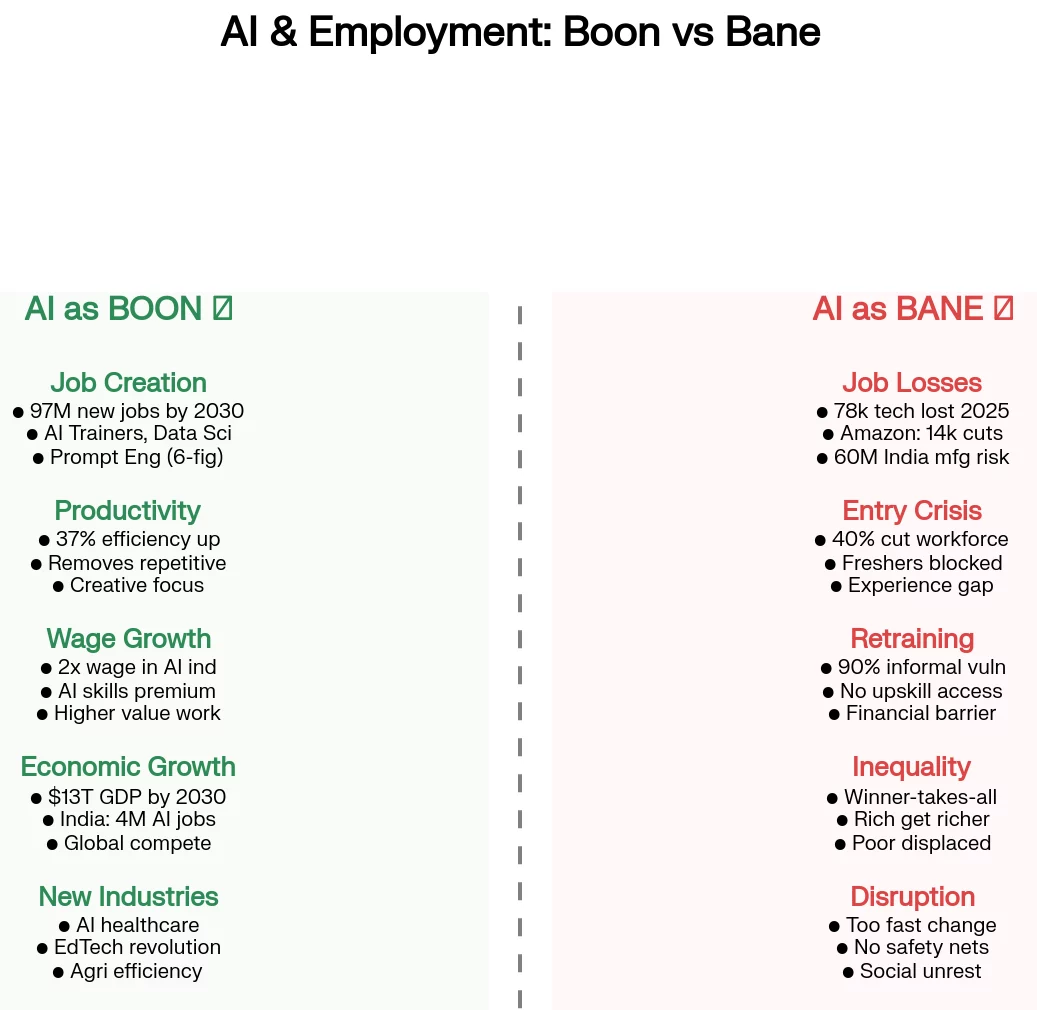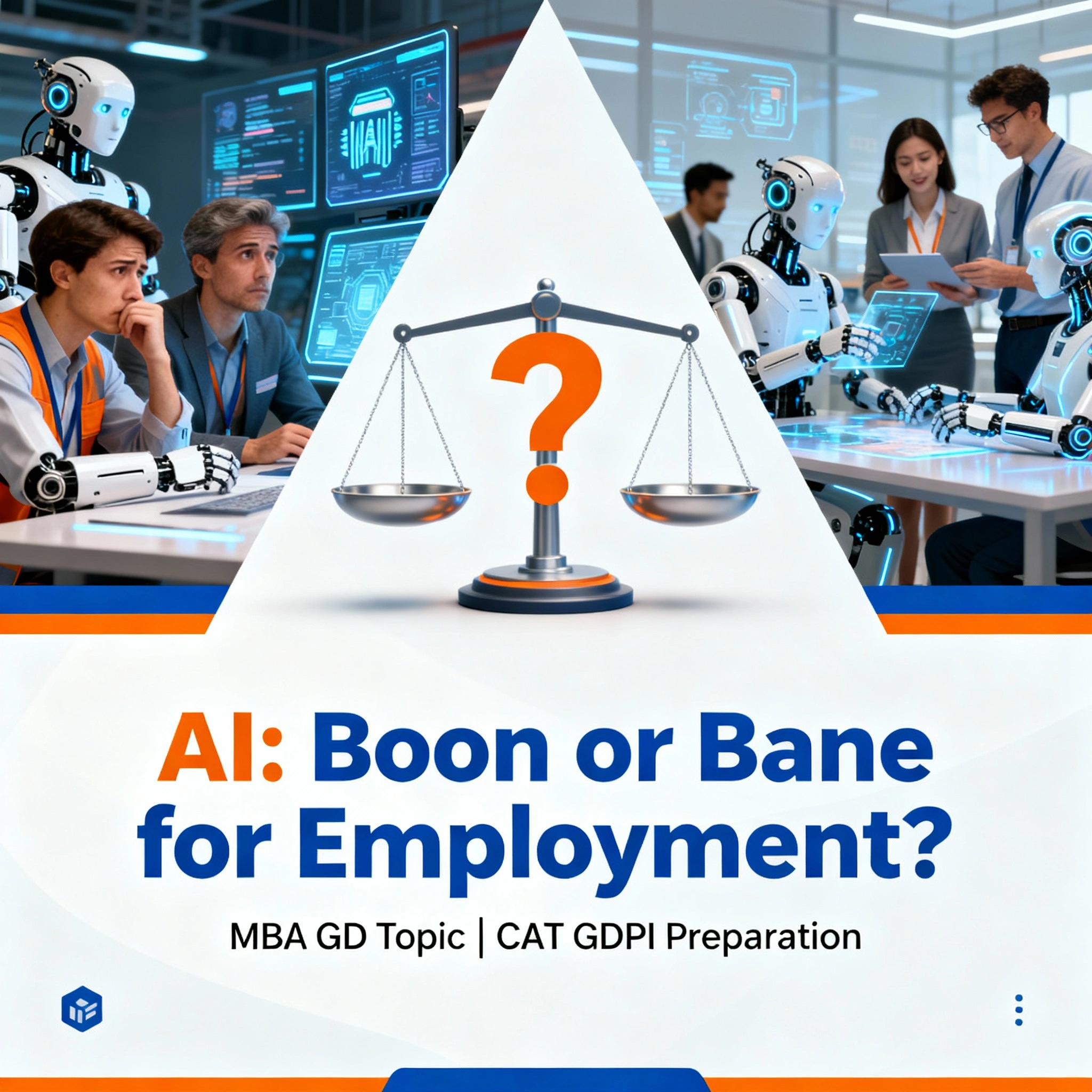Is AI a Boon or a Bane for Jobs? Is AI Creating Jobs or Destroying Them?
AI is not futuristic anymore — it’s happening now and is rapidly transforming industries and economies. AI has introduced groundbreaking innovations that promise efficiency and convenience. However, employment forces face an underlying question: AI is boon or bane for jobs? Let’s explore the different perspectives to know the possible benefits and threats of AI impact on jobs.
AI, Boon or Bane for Jobs – Introduction & Context:
According to a job report in 2023, automation and AI can disrupt 85 million jobs globally by 2025, but it will also create around 97 million new jobs.
From banking to manufacturing, healthcare to marketing, AI has transformed how we work, hire, and learn. It’s helping businesses scale faster and workers become more productive. But it’s also making many traditional roles obsolete.
How AI is a Boon for Employment
-
Enhanced Productivity and Smarter Decision-Making
AI automates mundane tasks and allows the workforce to focus on more meaningful work. Eventually, it increases job satisfaction and motivation to perform better in employees. The invention of generative AI has reportedly improved the performance of a highly skilled workforce by 40%. According to recent research reports, it’s clear that employees implementing AI tools and techniques in their job experience higher scores in work-life balance (26%). They report a high score in overall job satisfaction at 31% along with a higher sense of belonging at 32%.
Such productivity and job satisfaction improvements are higher in skilled employees than in those who don’t use AI, and it will always be better for those who use AI to perform their tasks in the future as well.
-
New Job Categories Are Emerging
AI has opened up entire industries that didn’t exist a decade ago, like data science, machine learning, AI ethics, and automation engineering. Today, there’s a growing demand for roles like Prompt Engineers, AI Trainers, and Data Analysts, especially in India’s booming tech ecosystem.
Companies like TCS, Infosys, and Accenture hire thousands of professionals in AI-enabled roles that combine human judgment with technology.
-
Global Upskilling and Accessibility
AI has democratised learning through personalised education. Platforms like Coursera and LinkedIn Learning use AI to recommend skill-based courses, making reskilling easier for professionals across industries. AI has also made business applications like customer care and pricing models easier than ever before.
This means that AI doesn’t just take jobs; rather, it changes them, and people who adapt to AI gain new career opportunities faster than ever.
How AI is a Bane for Employment
-
Job Displacement and Inequality
AI poses noticeable challenges to the job market. The biggest fear is automation replacing low-skill and routine jobs. Automating several clerical tasks has reduced human dependency and negatively impacted the number of jobs.
- Approximately 14% of human labourers have experienced job loss due to AI. Moreover, fully automated manufacturing facilities can operate without human labour.
- McKinsey estimates 60 million manufacturing workers in India could be displaced by 2030. World Bank says 69% of Indian jobs are potentially automatable.
- Yes, new jobs will be created. But will they be produced fast enough? And will the displaced workers have the skills for those new jobs?
Example: In the automobile sector, robots handle assembly lines that once employed thousands of workers. Similarly, AI chatbots are replacing customer service agents globally. As a result, a widening skill gap arises where high-tech professionals thrive and unskilled workers struggle.
-
Economic Polarisation
AI benefits large corporations with access to technology and data, while small businesses lag behind. This creates a divide not just between rich and poor nations, but between urban and rural economies. In India, metro cities like Bengaluru and Hyderabad are booming with AI-based jobs, but smaller towns are being left behind.
-
Human Value Erosion
While AI can mimic intelligence, it can’t replicate human empathy, creativity, or ethics. Overdependence on AI might lead to a loss of human touch in decision-making, especially in healthcare, education, and customer interaction. This, eventually, can harm mental health by eroding traditional collaboration methods among humans. It may lead to isolation and reduced motivation among workers.
Imagine therapy sessions or classrooms run entirely efficiently by AI, yes, but emotionally disconnected.
Social Angle: AI, Boon or Bane for Jobs
AI employment is about redistribution, and not elimination. AI’s impact on jobs may not affect the job market; instead, it can be reshaped with more opportunities. The artificial intelligence and employment forces can work wonders when combined. Just as the Industrial Revolution replaced farmers with factory workers, AI will push people from repetitive jobs into more creative and cognitive roles.
The future of work with AI may seem challenging, especially in developing countries. However, AI automation and the workforce look promising if the benefits of AI reach all sections of society with formal reskilling frameworks, not just the elite few.
Also read: Prepare for CAT GDPI topics
AI Boon or Bane for Jobs
Key Takeaways: for CAT GD-WAT Rounds
| Aspect | Boon | Bane |
| Job Market | New-age roles in AI, data, analytics | Job loss in routine work |
| Skill Impact | Upskilling opportunities | Skill inequality |
| Economy | Boosts productivity & innovation | Increases polarization |
| Human Factor | Aids decision-making | Reduces human empathy |
Is AI a Boon or Bane for Jobs – How to Approach This Topic in a GD
- Start with Context: Briefly define AI and its relevance to employment.
- Present Both Sides: Use data and real-world examples for credibility.
- End with Balance: Emphasise that AI is a transition, not a threat, and adaptability is key.
Also read: CAT Exam





